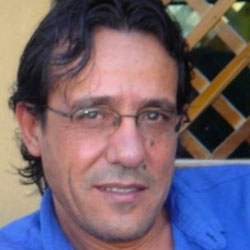When he comes down
or is seen coming down
when he reveals to us that he is coming down.
The waiting and silence
his entire lack
when he hearkens before the plants.
His caution when he comes down
like one postponed by a hush,
and by his being not “us”
and not “here”
death begins.
He bought a flower
nothing more, a flower
that has no vase and leaves no will.
From the hill, he can spot the military checkpoint, the paratroopers,
he can spot the squatters, the mountain edges, and the only road
where their feet will leave a print in the rocks, mud, and water.
Losses also will appear from the hill
abandoned without effort.
And the fragility in shadow,
the Jewish man with a long mustache
who resembles the dead Arabs here.
From the mountain edges, all the caves will appear peaceful
and the road will seem as it were.
While he was coming down
the caves continued to stare
and blink in the cold.
Notes on the Poem
This week, we're rereading a previous Poem of the Week and approaching it from some different vantage points. We have 9 years' worth of selections to choose from, and the poem that calls out to us is "An Enemy Comes Down the Hill", Fady Joudah's translation from the Arabic of Ghassan Zaqtan's original poem from the 2013 Griffin Poetry Prize collection Like a Straw Bird It Follows Me, and Other Poems. Let's examine this poem this time informed by some of our experiences reading and communicating through the myriad challenges of the worldwide pandemic.(We previously discussed the poem here.) Let's be grateful we are still managing to read - even if it's just snippets, something to which reading poetry lends itself - through the stresses and distractions of this singular time. Many who normally find solace in reading have noted in the last year that the concentration needed to derive those comforts has eluded them. As we seemed to be emerging from the first wave of this situation, Glenn Sumi of Toronto’s Now Magazine explained some of the science behind why this normally pleasurable pursuit had become difficult. As the first wave became successive waves, the problem persisted, prompting advice (here and here, for example) on how to spark one's reading enthusiasm again. Rereading and poetry make significant appearances. Rereading as a panacea to regain one's reading focus and momentum doesn't necessarily mean seeking out easy or comfortable reads. And that's where choices like this poem and collection are so appropriate. Sometimes it's the unusual or provocative that snaps you back to attention. As Scots Makar Jackie Kay remarked on Like a Straw Bird It Follows Me, "The poems compel you, outrage and upset you, but also fill you with wonder." As we observed when we last studied "An Enemy Comes Down the Hill", what is in sight and what is perceived in the poem are both presented in fine detail. Still, we asked ourselves then, are things as they seem? Jackie Kay is correct - we are intrigued and decidedly compelled. The opening stanza illustrates well how Joudah's words delicately balance what is seen, what is perceived, what the subject who is seen ("he", presumably the "enemy" of the title) tries to hide or convey - and how these can all be confused to blur what truly is. "When he comes down or is seen coming down when he reveals to us that he is coming down." While we imagine that an enemy would advance on us with caution, don't we also assume that advancing is a form of aggression, inherent in being an enemy? What then, do we make of his caution being gently described ... "like one postponed by a hush" What have we uniquely learned about communicating in this past year that might prompt us to reconsider how we reacted to these cues the first time we read this poem? For one thing, most of us are spending much more time online, often reluctantly in front of cameras and microphones, among others equally reluctant - and what have we learned about conveying and interpreting body language signs and miscues? Perhaps sufficient that articles about video call body language tips are pretty commonplace. Add to our online dissonances the frustration of a different kind of miscommunication during those rare occasions when we can meet in person and cannot express ourselves effectively because we're all wearing face masks. Is he of Zaqtan/Joudah's poem really an enemy then? He's carrying a flower, and there's that "fragility in shadow" that suggests vulnerability, not menace. Have we ever misjudged someone's expression or the seeming indifference of what appears in the background of their zoom calls? Do we despair then - even more so now - that we can never fully trust or comprehend each other? The caves are staring, but not so harshly that they don't also blink. Conversely, can we be heartened that how things appear can always be open to interpretation? If not put in the best light, can we assume that some appearances are at least benign and certainly not what they seem? In its way, does this poem cut us a bit of slack as we struggle with basic communications - incoming and outgoing - these days?
